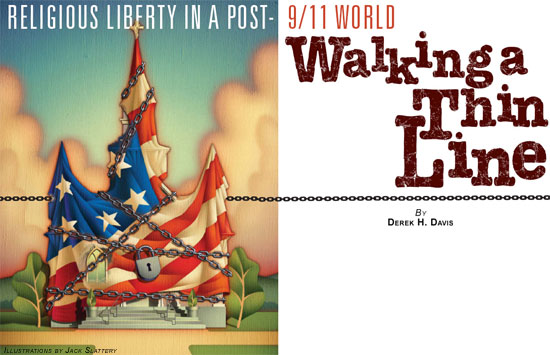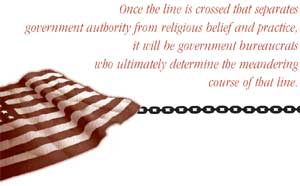Walking a Thin Line
Derek H. Davis March/April 2005
Getting your Trinity Audio player ready...

Since September 11, 2001, President George W. Bush and the United States Congress have been sometimes frantically creating legislation that will make America more secure. In the process, however, they are walking a thin line between protecting and trampling Americans' civil liberties. As our government officials work overtime to protect us from terrorists, they need increasingly to be mindful of the words of Benjamin Franklin, "They that can give up essential liberty to obtain a little temporary safety deserve neither liberty nor safety." As Americans enter a new era of security legislation, the most precious of all American freedoms, religious liberty, is on the verge of being subordinated to "national security" interests.
Legislative Enactments
In the wake of 9/11, Congress moved quickly to pass the controversial USA PATRIOT Act. Of special concern is the law's provisions that give broad powers to both the attorney general and secretary of state to reach into that traditionally sacred and protected ambit of American culture—religion. The skillful grafting of the American Constitution has thus far generally denied to government the power and opportunity to monitor religious systems that exist within U.S. borders, although religious charities are coming under increasingly rigorous scrutiny. Still, most Americans likely would contend that such protections should not extend to religious beliefs, doctrines, and practices that advocate the subversion of the state. Declarations of holy war by terrorists against the United States, and the growing suspicion that some terrorist groups have been operating covertly in this country, abusing the First Amendment's religious protections to plan their atrocities, beg the question of whether antiterrorism measures should be directed against religious groups, Islamic as well as non-Islamic.

A logical question that emerges from the antiterrorism legislation is whether a large religious group, such as the Shiite sect of Islam, could be labeled terrorist, and whether its clerics, both foreign and domestic, could be denied the right to speak publicly in the United States. Some Christians might applaud such a development; however, they should think twice. Once the line is crossed that separates government authority from religious belief and practice, it will be government bureaucrats who ultimately determine the meandering course of that line. The assumption that Christian groups will not fall under state surveillance for the mere reason that they are Christian is a highly presumptuous logic.
To date, only Islamic groups have come under close surveillance, but expanded efforts to locate potential terrorists make it virtually certain that non-Islamic groups will eventually find themselves under the government's microscope. Nevertheless, it appears that some Christians are of the mind-set that they will be excluded from possible future investigations of organized terrorism for the reason that they are members of the majority faith. Certain Christian groups, such as Pat Robertson's American Center for Law and Justice, have expressed unqualified support for the actions that Congress and the Justice Department have taken thus far. Even the activist organizations of "liberal Christianity" have been relatively silent considering the magnitude of changes currently taking place. The National Council of Churches and Christian World Service have voiced a few words of caution concerning extended detentions, but on the whole, Christians in the United States have expressed little resistance to what are arguably the most radical changes affecting civil rights in America in the past 30 years.
In addition to passing the USA PATRIOT Act, Congress created in November 2002 the Homeland Security Department, the largest single agency in the U.S. government. It has an annual budget of $40 billion and employs about 170,000 persons, all in the interest of protecting Americans from terrorism and other acts of violence. Homeland Security will have the primary responsibility of searching out and locating potential terrorists under the USA PATRIOT Act. The size and resources of Homeland Security alone increase its potential to locate terrorists, but simultaneously to encroach upon the heretofore private rights of countless persons.
Living With Fear
Americans are reluctantly adjusting to living with terror. Their ability to handle threats increases daily as the Homeland Security Advisory System remains in the heightened awareness colors of yellow, orange, or red, and rarely reaches the calmer blue or green. The fall 2002 sniper attacks in the Greater Washington, D.C., area reminded us that terrorism and outrageous acts of violence are not something that can be vanquished, but are a reality that will always haunt us.
How do we balance our security needs and traditional freedoms such as religious liberty? Leti Volpp has argued that current U.S. policy labels citizens as terrorists.1 While the government does not explicitly target citizens, an "us versus them" paradigm has rendered Arab-American freedom a casualty. "Those who appear 'Middle Eastern, Arab or Muslim," says Volpp, "are now being thrust outside of the protective ambit of citizenship as identity."
The debate about whether racial profiling might have prevented the attacks and therefore should be a legitimate policy has been reopened. One sector of society that has struggled and will struggle the most with a policy of profiling is the airline industry. Floyd Abrams, who served on a panel advising against racial profiling a few years ago, stated that after 9/11 the airline industry was challenged to "walk a line that avoids simplistic ethnic profiling while still allowing commonsense law enforcement." And this racial profiling could easily be turned into religious profiling of Muslims. An ABC News/Beliefnet poll demonstrated that 33 percent of Americans have an unfavorable opinion of Islam. Another finding indicates that 35 percent of Americans believe Islam does not teach respect for other faiths. These numbers reflect that the American perception of Islam is not good, and that it is worsening. Clearly, 9/11 has done irreparable damage to Christian-Islamic relations. As sentiments like these fester and grow, including beliefs that "terrorists" have no rights and deserve no protections, our minds should immediately turn to a similar dark time in our nation's history—the Japanese internment.
The present generation's "day of infamy" eerily parallels the WWII era and the horrifying Japanese internment. Looking back to World War II, the government was forced to weigh the competing interests of racial equality and security when the presence of Japanese-Americans struck fear in the hearts of many Americans. Securing the nation outweighed the obvious pattern of ethnic discrimination that ensued in the form of massive internments. While President Bush has not invoked his authority in a way reminiscent of Roosevelt's Executive Order 9066, the dichotomy between citizen and noncitizen could be the groundwork for further violations under the guise of military necessity. A Gallup poll two years ago revealed that internment for those of Arab descent is favored by one in three Americans.2 And the sentiment is increasing. Obviously, many Americans are willing to deny rights to an individual simply because of their race. Had the poll asked if one should be denied rights because of their religion, the result would likely have been the same.
Michael Linfield, in his book Freedom Under Fire, notes that there have always been violations of civil liberties in times of war. In the Revolutionary War and Civil War, Blacks were enslaved, and genocidal atrocities were committed against Native Americans. In WWI, WWII, and the Korean War there were virulent attacks against ethnic minorities. In the Vietnam War certain minority activists were abused, jailed, and according to some, murdered by government agents.
The argument Linfield wants to make is that deprivation of civil liberties has become an accepted norm during times of war. Ramsey Clark wrote that "war is more destructive to freedom than any other human activity. Any violation of civil liberties is easily justifiable in times of war and threat of war, however unnecessary for security, harmful to its victims, irrational, unfair, or even detrimental to the war effort itself."3 Justice Thurgood Marshall expounded upon this idea in the Supreme Court's Skinner v. Railway decision (1989) stating, "History teaches that grave threats to liberty often come in times of urgency, when constitutional rights seem too extravagant to endure."
Currently, hundreds of noncitizens remain detained without warrant or legal representation or even a guarantee that either charges will be filed against them or they will be released within a specific time frame. The PATRIOT Act sanctions this suspension of rights. But citizens are also at risk. Before 9/11 a Muslim intern was unexpectedly removed from a meeting at the White House. The Muslim community was outraged, and two dozen leaders of the Muslim community abandoned their meeting with the Office of Faith-Based and Community Initiatives in protest. When action like this can be taken without a threat of terror, the likelihood that it will occur with a looming threat is obvious.
Protecting Our Freedom
Religious liberty is the central pillar that establishes American freedom as unique and enduring. Yet religion is at risk of losing its sacred and protected status because of its identification with terror. This association of religion with terror, and its ability to engender fear in the hearts of Americans, in combination with legislation and policy changes that enable expanded powers of government surveillance have ominous implications for the nation's religious traditions. Should government be allowed to actively monitor the beliefs and activities of religious groups, it will become nearly impossible to retract those incursions even if it is recognized that they are causing harm to American society. Assertions of the temporary nature of counterterrorism measures based on rollback provisions or other assurances mean little. The intractability of government bureaucracy and the persistence of the welfare state exist as testaments of government's reluctance to give up power once achieved. No reason exists to believe that government will be more conciliatory toward religion if it is able to skirt constitutional protections and encroach upon the religious lives of the American people.
There is no attempt here to minimize the modern threats to our nation and to other countries that find themselves at odds with terrorist fanatics. Nor is there any justification given for the horrendous acts of 9/11 that inflicted so much pain and suffering upon the entire nation.
The government is rightly pursuing those who perpetrated these acts and is well justified in applying the severest punishment under the law not only to the perpetrators but also to those who aided them. The intention here is in concert with that of American citizens who have insisted that the terrorists must not "win." But it must be recognized that terrorists "win" not based on buildings destroyed or planes crashed or people killed. They win principally by destroying the fabric of the societies they target, and that fabric includes the institutional relationships, including that between church and state, which enable spiritual vitality, material prosperity, and human liberty.
________________________
Dr. Derek Davis is Director of the J.M. Dawson Institute of Church-State Studies, Baylor University, Waco, Texas.
________________________
1 Leti Volpp, "Critical Race Studies: The Citizen and the Terrorist," UCLA Law Review 49 (June 2002).
2 Gallup Poll Analysis: The Impact of the Attacks on America, www.gallup.com/poll/releases/prO 10914c.asp.
3 Michael Linfield, Freedom Under Fire: U.S. Civil Liberties in Times of War (Boston: South End Press, 1990), p. xvii.